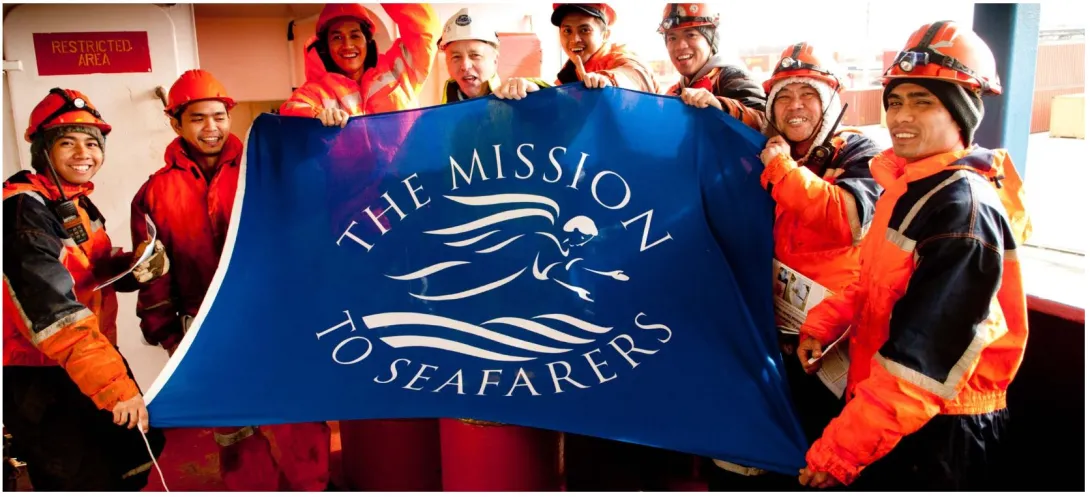Of the many things we learned in 2020, the most important was the need to provide immediate support to seafarers working through Covid-19 and the associated crewing crisis. When the need to help strikes, it is essential to provide it as soon as possible, but this can be difficult when they’re at sea, between ports, and in many cases, working beyond their contractual obligations.
The issue: support during Covid-19
According to Reverend Canon Andrew Wright, Secretary General at The Mission to Seafarers, during 2020, “There have been many hurdles in sustaining our port-based operations. However, in very many contexts we have found ways to continue serving seafarers – including socially distanced and carefully planned “gangway” ship visiting, together with supply delivery and the preparation of care packages.”
Despite the obvious challenges, The Mission to Seafarers has focused on ways to manage health and safety requirements, in order to provide ongoing support. “I have been so pleased with the determination of our teams to find safe, legitimate and creative ways of continuing work. In addition, we have very significantly developed our ability to reach out to seafarers digitally, including through our excellent new Chat to a Chaplain facility. Our Family Support Networks have also been highly proactive,” he says
The solution: Mission to Seafarers Flying Angel Campaign
The Mission to Seafarers was quick to develop a strategy aimed at providing immediate support to seafarers in need. Their Flying Angel Campaign was created to raise £600,000 for seven separate projects, in addition to a general fund where money could be allocated where it was most needed. After just 14 weeks, the Mission was able to raise £614,000, thanks in large part to generous donations from various organisations within the maritime industry.
In recognition of the long-term impact of the pandemic, the Mission is responding with the creation of a new fund to help provide long-term support over the next 18 months. As an extension of the Flying Angel Campaign, the Sustaining Crew Welfare fund will help sustain the Mission’s Advocacy & Welfare programmes as well as its global operations for 2020 and 2021, ensuring that vital frontline services are maintained to serve seafarers.
Solution one: digital communications
Enhanced digital support was a key requirement. The Chat to a Chaplain platform was set up so that 25 trained and qualified chaplains located in all time zones could provide real-time support to seafarers with immediate concerns. The chaplains are qualified in mental first aid and pastoral counselling that could be delivered online, fast. While it doesn’t replace face-to-face support, it gives those in need an opportunity to talk to someone at any time. Funding was received from Seafarers’ UK and the Marine Society for the first six months of this project, with funds also being raised from The Mission to Seafarers’ Global Champions Unite virtual event.
In addition, the Seafarers’ Happiness Index app which is yet to be developed, will provide another platform for the ‘Chat to a Chaplain’ service, key wellbeing and welfare information, The Sea - our seafarers’ newsletter, and signposting to other useful updates.
Improved connectivity was also a priority, with several seafarers without access to internet on board their ships and many denied shore leave due to Covid-19. The Mission to Seafarers believed that Mifi units would help to provide more communication options. Chaplains can lend the units to ships arriving in port and collect them before they sail.
Solution two: safe port services
Given the health concerns associated with Covid-19, it was essential to ensure the 121 Flying Angel Centres around the world could continue to operate safely, which meant ongoing deep cleaning, PPE equipment for port teams, Perspex screens fitted to protect staff and visitors, hand sanitising stations, minibus adaptations to safely transport seafarers and new signage to promote clear pathways around the buildings and social distancing.
Finally, The Mission to Seafarers needed to raise funds for its ongoing advocacy work. Seafarers need not only people to talk to, but people to advocate for their needs. This includes issues such as justice and welfare cases, repatriation, abandonment, late payment of wages, shortages of food and money, piracy, bullying and discrimination, given these concerns worsened during Covid-19.
According to The Mission to Seafarers, advocacy work is vitally important part of their response to the most urgent and distressing of seafarers’ needs, and requires patience, compassion, and due diligence to ensure support is delivered efficiently and correctly.
Learn more about the Mission to Seafarers Flying Angel Campaign
